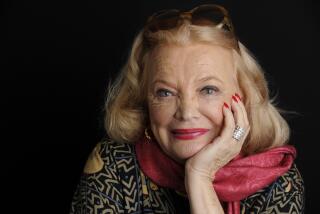Lou Rawls, 72; Grammy-Winning Singer With a Voice Like Velvet
- Share via
Lou Rawls, the Grammy Award-winning singer whose velvety baritone was one of the most recognizable voices in pop music on hits such as “Love Is a Hurtin’ Thing,” “Lady Love” and “You’ll Never Find Another Love Like Mine,” died Friday. He was 72.
Rawls died of lung cancer at Cedars-Sinai Medical Center in Los Angeles, said his publicist, Paul Shefrin. Rawls, who had lived in Scottsdale, Ariz., since 2003, was diagnosed with lung cancer about a year ago.
Rawls’ career included more than 70 albums, three Grammys, 13 Grammy nominations, one platinum album, five gold albums and a gold single.
His distinctively rich baritone has been described as “dark as mahogany, as deep as a rolling river” and “as warm as smooth gravel heated over a fireplace.”
After hearing a performance in Las Vegas, Frank Sinatra described Rawls as having “the classiest singing and silkiest chops in the singing game.”
Widely praised as a song stylist, the Chicago-born singer defied categorization: During his career, he sang gospel, blues, jazz, soul and pop.
“I don’t put myself in any particular category,” said Rawls, who began singing in a Baptist church choir as a young boy. “Whatever the occasion calls for, I rise to the occasion. There are no limits to music, so why should I limit myself?”
Singer-actress Della Reese, a longtime friend, told The Times on Friday that no matter what type of music, Rawls “brought with him the roots of gospel music.”
As a performer, she said, “He gave you your money’s worth; he absolutely did. When you came to see him, you felt like you had a good time.”
A longtime education advocate, Rawls viewed his annual fundraising telethon for the United Negro College Fund, “An Evening of Stars,” as his “proudest achievement.”
Since 1979, the telethon has raised more than $200 million for 39 private, historically black colleges and the 60,000 students who attend them. The United Negro College Fund also provides more than 10,000 scholarships to students attending nearly 1,000 colleges and universities across the country.
“This was a man who was passionate about black kids getting a college education, and he devoted a tremendous amount of his career to making that happen,” Michael Lomax, president and chief executive of the United Negro College Fund, told The Times on Friday.
A four-hour telethon, which Rawls taped at the Kodak Theatre in Hollywood in September, is scheduled to air at 3 p.m. today on KNBC-TV Channel 4. It will also be broadcast on the BET cable network beginning at 7 p.m. Sunday.
During Rawls’ performances, text at the bottom of the screen will acknowledge his passing.
Originally signed to Capitol Records, Rawls made his first solo release in 1962 with the jazz album “Stormy Monday” (also known as “I’d Never Drink Muddy Water”), which he recorded with the Les McCann Trio.
In his live act, Rawls had begun prefacing some of his songs with lengthy monologues, explaining that his remarks grew out of necessity.
“I started talking because it was the only way to get people’s attention,” he told The Times’ late jazz critic Leonard Feather in 1967. “For years, I played nightclubs, working the chitlin circuit. These clubs were very small, very tight, very crowded and very loud. Everything was loud but the entertainment. The only way to establish communication was by telling a story to lead into the song. That would catch people’s attention.”
Rawls’ monologues were memorably showcased in his 1966 jazz and blues album “Lou Rawls Live!”
In his richly voiced lead-in to the song “World of Trouble,” he painted a vivid portrait of a young Chicago hustler standing on the corner of 47th Street and South Parkway looking for his girlfriend:
“He has on his silk mohair $250 hustler suit, fresh out of the pawnshop, the highly shined alligator shoes, the white-on-white shirt, the very thin, silk hustler’s necktie, the very large artificial diamond stickpin ... his hair is very heavily conked; he is quite patent-leatherish about the head ... he is wearing his hustler’s shades ... as you see how elated this young man is, you can’t help but notice his Cadillac parked at the curb; white on white in white ... the finance company wonders where he is keeping his car tonight.”
Feather wrote: “The monologue lasts about as long as the song (3 1/2 minutes). It sets up the mood so perfectly that the audience lives every moment of it.... After eight years of scuffling, the simple process of telling it like it is took Lou Rawls out of the neighborhood bars into the millionaire belt.”
The 1966 “Lou Rawls Live!” album went gold and marked the singer’s crossover into the mainstream market. But it wasn’t until later that year that Rawls had what is considered his star-making hit, “Love Is a Hurtin’ Thing.”
The single, part of his “Soulin’ ” album, reached No. 1 on the R&B; chart, almost cracked the pop Top 10 and received two Grammy nominations.
Rawls’ most famous spoken introduction was on “Dead End Street,” for which he won his first Grammy for best R&B; vocal performance in 1967.
The “Dead End Street” introduction varied in live performances, but it described Chicago in the wintertime, “when it’s around 10 above and it’s about 12 inches of snow outside, and the hawk -- I’m speakin’ of the almighty hawk, Mr. Wind -- when he blows down the street around 35, 40 miles an hour, it’s just like a giant razor blade blowin’ down the street, and all the clothes in the world can’t help you.”
His second Grammy was for the 1971 album “Natural Man.” And his 1977 album “Unmistakably Lou” earned him his third Grammy for best R&B; vocal performance.
After signing with producers-songwriters Kenny Gamble and Leon Huff’s hit-making Philadelphia International Records label, Rawls had the biggest album of his career in 1976 with “All Things in Time.” The platinum-selling album included his most successful single, “You’ll Never Find Another Love Like Mine,” a No. 1 R&B; hit that also rose to No. 2 on the pop charts.
Long after his last song on the charts, “I Wish You Belonged to Me” in the late 1980s, Rawls continued to be a popular concert performer.
“His voice, with its unique timbre and the emotional catch, is one of the great warm and fuzzy sounds of pop and jazz music,” music critic Don Heckman wrote in a Times review of a 2002 Rawls performance at the Cerritos Center for the Performing Arts.
Raised by his grandmother on the South Side of Chicago after his parents went their separate ways shortly after he was born, Rawls joined the junior choir at his grandmother’s Baptist church at the age of 7 and sang with different gospel groups as a teenager.
After moving to Los Angeles in the 1950s, he joined the Chosen Gospel Singers, with whom he made his first recording. He next joined the Pilgrim Travelers, a gospel group that included a young friend from Chicago, Sam Cooke. (Rawls later did the uncredited call-and-response with Cooke on the 1962 classic “Bring It on Home to Me.”)
After a two-year stint in the Army with the 82nd Airborne Division, Rawls rejoined the Pilgrim Travelers.
While driving to a performance in Memphis, Tenn., on a rainy night in 1958, the group’s Cadillac collided with an 18-wheeler truck. The group’s driver was killed, the guitar player’s collarbone was broken, Cooke got a small piece of glass in his eye and Rawls suffered a severe concussion.
It took Rawls, who remained in a coma for 5 1/2 days and suffered a three-month memory loss, more than a year to fully recover.
“I really got a new life out of that,” he told the Los Angeles Sentinel in 1998. “I saw a lot of reasons to live. I began to learn acceptance, direction, understanding and perception -- all elements that had been sadly lacking in my life.”
After the Pilgrim Travelers broke up in 1959, Rawls launched his solo career.
He was performing at Pandora’s Box, a small Sunset Boulevard club, when Capitol Records producer Nick Venet heard him sing. Venet was so impressed with Rawls’ four-octave range that he invited him to audition, and Rawls was signed to the label.
With his career riding high in 1976, Rawls was signed to be national spokesman for Anheuser-Busch, which led the brewing company to co-sponsor -- at Rawls’ suggestion -- a telethon to benefit the United Negro College Fund.
In 1979, Rawls began hosting “The Lou Rawls Parade of Stars.” The annual telethon, which later changed its name to “An Evening of Stars,” went national in 1980.
“I run into older people who shake my hand and say, ‘Thank you. For the first time in my family’s history my grandchild is going to attend college,’ ” Rawls told The Times in 1990.
On New Year’s Day 2004, Rawls married his third wife, Nina, a 33-year-old flight attendant, with whom he adopted an infant son, Aiden. Less than two years later, however, Rawls filed for an annulment, saying that he wanted to protect his financial assets.
It was during the annulment hearing in early December 2005 that his wife revealed that the singer had been diagnosed with lung cancer. About the time of the hearing, Rawls was hospitalized at Cedars-Sinai Medical Center.
Shefrin could not confirm reports that Rawls had also been diagnosed with brain cancer in May. But he said the singer’s wife told him that Rawls “had been treated for brain cancer and at a given point he was clean.”
Shefrin added that the couple had recently reconciled and withdrawn their annulment proceedings and that Nina Rawls was at her husband’s side when he died.
Reese, who visited Rawls in the hospital last week, said they prayed together and “he was in a wonderful place for the condition he was in. He was the man I always knew. He was standing on his two feet, handling what was happening to him.”
In addition to his wife and young son, Rawls is survived by three other children, Louanna Rawls, Lou Rawls Jr. and Kendra Smith.
Funeral services are pending.
More to Read
The biggest entertainment stories
Get our big stories about Hollywood, film, television, music, arts, culture and more right in your inbox as soon as they publish.
You may occasionally receive promotional content from the Los Angeles Times.










